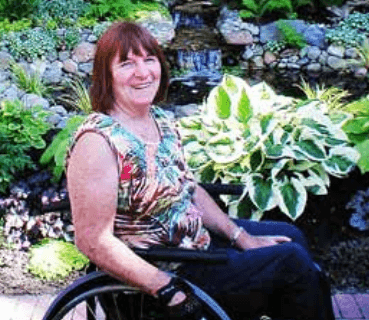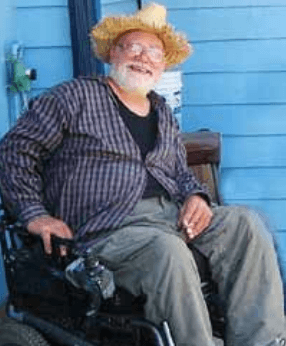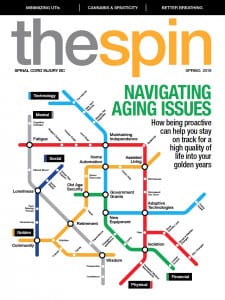
“Aging happy and well, instead of sad and sick, is at least under some personal control,” once wrote the brilliant Harvard psychiatrist and author, George E. Vaillant. “We have considerable control over our weight, our exercise, our education, and our abuse of cigarettes and alcohol. With hard work and/or therapy, our relationships with our spouses and our coping styles can be changed for the better. A successful old age may lie not so much in our stars and genes as in ourselves.”
In recent decades, variations of Vaillant’s view of aging have become more common in the world of medicine, in both research and everyday practice. A singular focus on simply preventing or postponing death has given way to an emphasis on increasing quality of life in our later years—and an understanding that the way we live our younger lives is the key to making this happen.
For readers of The Spin, the need to plan for our older years may be even more vital, since SCI brings with it a host of secondary complications, a tendency to overuse certain body parts in order to remain mobile and independent, and a predisposition to a range of cardiovascular and pulmonary disorders.
With all this in mind, we set out to examine health and aging in people with SCI—how SCI affects aging, the most common physical and mental health problems people with SCI are likely to experience, and the ways that planning and prevention can help mitigate the threat and improve quality of life in our later years. Lending a hand are two recognized experts in SCI and aging: Denver’s Dr. Susan Charlifue, and Dr. Sander Hitzig from Toronto. Charlifue is Co-Principal Investigator of the SCI Model System at Craig Hospital, and she has managed and completed seven major investigations of aging with SCI in the USA and the UK. Hitzig is a scientist at St. John’s Rehab Research Program at Sunnybrook Research Institute, an assistant
professor at the University of Toronto, and an affiliate scientist at the Toronto Rehabilitation Institute. His research focus is examining the consequences of
aging with an SCI and other disabilities, and identifying factors that promote
health and wellbeing.
Let’s start with a caveat.
When it comes to SCI and aging, there’s a lot we know. But both of our experts, Charlifue and Hitzig, made it abundantly clear: there’s a lot we don’t know. Aging and geriatrics research in the general public is a growing field—not surprising, given our greying population. But people with SCI form a very small subset of the general public, one that’s had arguably more pressing issues that have demanded attention. So aging in people with SCI really hasn’t been the subject of a great deal of quality research.
Add to this the fact that every individual ages differently. There are many factors involved—where you live, your financial means, your support network, your ethnicity, your ancestry, and, specific to SCI, your level and completeness of injury. So some observations and recommendations we make here may be relevant to your individual situation, and some may not.
So…how long will you live?
The short answer is, no one knows. We are all different and for any individual, life expectancy can’t be predicted. What we do know is that, in general, SCI can impact life expectancy, but less so than was the case in decades past. The general consensus is that the average life expectancy for people with SCI hovers just below the average for the general population.
The bad news is that level and completeness of injury can make a difference in terms of life expectancy. Here’s what our friends down the road at the University of Washington’s Northwest Regional Spinal Cord Injury System say about longevity on their website: “By 1998, persons with SCI had an estimated life expectancy that showed greater resemblance to that of the general population: for those with complete tetraplegia (quadriplegia), life expectancy was 70 percent of the life expectancy of the general population; for those with complete paraplegia, it was 86 percent; and for anyone with significant motor preservation (incompleteness), it was about 92 percent.”
Given that this data is 20 years old, we can probably assume there have been modest further improvements in these estimates. The bottom line is that anyone who is paralyzed from an SCI has the potential of living a long and fulfilling life. But that doesn’t mean it’s a given.
Physical Health: Triple Jeopardy
It turns out that aging can present a triple threat for people with SCI. First, you may have to deal with the same age-related risks that everyone else is at risk of. No one, disabled or not, gets a pass when it comes to the aging process. Disease, fading strength and mobility, a growing waistline—these are potential realities for every human being, including people with SCI.
Second, while there are large gaps in knowledge, it’s clear that, with age and over time, SCI contributes to and amplifies decline in various body systems. The result is an elevation of risk in key areas, which we’ve listed in the box below this paragraph. Denver SCI peer counsellor and researcher Richard Holicky, who has been writing about SCI issues since his own injury in 1989, summed it up nicely in a 2014 feature in New Mobility magazine: “In addition to the normal wheeler problems—skin breakdown, shoulder problems, pain and plumbing malfunctions—we’re also more likely to face high blood pressure, cholesterol disorders, diabetes, and being overweight or obese. Nor are we immune to more mainstream diseases such as coronary artery disease and cancer.”
Physical Health Implications of SCI & Aging
People with SCI are at risk from many of the same health problems as the general population. But your SCI can increase the risk of some of these threats, and in some cases, trigger their early onset. Not only that, you’re also susceptible to a variety of other conditions specific to your SCI. But don’t despair—as you’ll read, taking steps while you’re younger can help alleviate many of the risks.
Nervous System: Decreases in strength, walking ability, reaction time and fine motor skills are all possibilities. Although rare, you could also experience worsening of neuropathic pain. And overuse of upper extremities can lead to nerve entrapment in the shoulders and arms—up to half of people with SCI deal with some kind of pain in their upper extremities.
Musculoskeletal System: Common problems are osteoporosis (loss of bone mineral density) and resulting risk of fractures, and once again, overuse of the shoulders, resulting in nerve entrapment and rotator cuff injuries—many of which can be irreversible. Other potential problems are arthritis, joint stiffness, and overall diminishing of strength.
Cardiovascular System: Cardiovascular disease (CVD) is the leading cause of death for people with SCI. People with SCI are three times more likely than non-disabled people to have heart disease, and four times more likely to suffer a stroke. Many CVD risk factors—blood pressure disorders, inflammation, abnormal cholesterol, and abnormal blood sugar—can be amplified by SCI.
Respiratory System: SCI compromises our breathing ability, and aging can amplify this effect. This contributes to fatigue and a loss of vitality, and an increased susceptibility to pneumonia and sleep apnea. All of these conditions can, in turn, elevate the risk of CVD.
Gastrointestinal System: Increased constipation, incontinence, gallstones, acid reflux, and weight gain are all commonly reported as people with SCI age, and may necessitate changes in programs, diet and personal assistance.
Urinary System: Age also commonly brings with it decreased bladder capacity and kidney function, increased risk of UTIs and kidney stones, and increased risk of bladder cancer.
Immune & Endocrine Systems: For people with SCI, age can further limit the body’s already compromised ability to produce key hormones—human growth hormone, testosterone, and estrogen. As well, insulin production can decrease, leading to higher risk of diabetes. And the overall immune response is often compromised with age.
Integumentary System: SCI brings many risks to skin health no matter your age, but aging compounds the problems. Decreases in collagen production, skin elasticity and thickness are all common. This, along with a loss of “padding”, makes aging skin more susceptible to burns, tears, bruises, and pressure ulcers.
Others: Increased sexual dysfunction and spasticity are also potential problem areas.
Third, SCI often triggers some declines in some body systems prematurely. “There is a body of evidence that suggests that, in some body structures, people with SCI may see changes earlier than their non-disabled peers,” says Charlifue. “For example, upper extremity musculoskeletal changes due to pushing wheelchairs will be evident, as will some other osteoarthritic changes.”
Hitzig agrees. “We do know that people with SCI are at risk from premature aging in some of the body systems—most notably in the cardiovascular, endocrine and musculoskeletal systems,” he says. “This means that people with SCI, especially those who rely primarily on wheelchairs for mobility, are at higher risk for earlier onset of cardiovascular disease and diabetes. As well, there is a higher risk for osteoporosis, even in young adults, and there are high rates of shoulder pain.”
Both Charlifue and Hitzig say that it’s not clear if these premature declines are a byproduct of age itself, or the number of years since injury.
“Duration of injury is a factor in some cases, but isn’t always the determinant,”
says Charlifue.
“In terms of the cardiovascular and endocrine systems, it’s difficult to tease apart what’s occurring due to chronological age and what’s due to years post-injury,” adds Hitzig. “But some of the studies suggest that inactivity and sedentary lifestyles are the contributing factors in these cases (thus, years since injury is likely involved). In terms of the musculoskeletal system, years post-injury plays a prominent role. Interestingly, in some adults who sustain their injury when older, they don’t lose as much bone mass compared to younger adults, because they may have already experienced typical age-related losses in bone mass, and they have ‘less to lose’ so to speak.”
At this point, you’re probably wondering, “What chance do I have, given this
aging triple threat?” But it’s not all bleak.
Planning: The Key to Aging Well
As we’ve already outlined, aging with SCI can be challenging. Not only do you have to worry about all the standard age-related health problems that everyone is at risk of, but you have to deal with the fact that SCI amplifies the threat of some of these scenarios—and that in certain areas, it triggers early onset as well.
The good news is that you can lessen the severity of some of these threats, and even eliminate them.
“Fortunately, some of these issues can be addressed through lifestyle changes—eating better, not smoking or drinking, and exercising regularly,” says Hitzig. “Although it can be more difficult for people with SCI due to paralysis and impact of other secondary health conditions like pain, living a more healthy lifestyle will help to circumvent or mitigate the onset of cardiovascular disease and diabetes. Eating healthier may also have benefits for the digestive system, and having a good diet can help skin integrity and bone health. Trying to adopt a healthier lifestyle—for instance, adhering to a Mediterranean diet or getting regular exercise—will benefit the whole body, and should be a priority, for people with SCI and anyone else.”
Charlifue points out some other good habits that can pay off. “I think the advice I would offer is probably the same as we would offer to anyone who is aging in general—get immunizations; don’t smoke; use alcohol sensibly if you use it at all; develop a strong social network of family, friends, and faith community if that’s important to you; and make sure you have a good network of health care providers who listen to you.”
In other words, cleaning up your act can help. But here’s where it gets a little tricky: adopting a healthy lifestyle when you’re already in the midst of your later years—or already dealing with one of the age-related health threats we’ve discussed—can only help so much.
What’s required is a proactive approach. If you want to increase your chances of living well into your later years, you need to take action now. Make a plan while you’re younger and healthy, and act on it. And if you think you’ve got oodles of time, think again.
“It’s always important to plan ahead, and this is probably the best advice we can give,” says Charlifue. “If something you’re doing causes pain, look for alternative ways of doing things to minimize that pain. If you have weight issues and your diet could use some adjusting, try to make small but meaningful changes now to help control obesity—which also has a negative impact on weight shifts, transfers, etc. If you have consistent bowel or bladder troubles, seek other ways to manage bowel and bladder evacuation. If you have pressure sores, greater attention early on will help minimize repeated pressure injuries.”
Hitzig is equally adamant that the time to take action is right now, no matter how young you are.
“Unfortunately, people with SCI don’t have the luxury of putting off beneficial lifestyle changes, because of the number of challenges to their health,” he says. “An able-bodied person who is in their 20s might be able to eat whatever they want, not exercise, drink and party, smoke—and then might be able to get their act together when they’re a bit older and reverse some of the effects of the negative lifestyle choices. People with SCI don’t have this luxury. Given the changes to a person’s body post-injury, especially with relation to losing bone mass in the lower limbs and physiological changes that happen to the cardiovascular and endocrine systems, there is a need to be proactive in making health a number one priority.”
Hitzig admits that he often feels a bit guilty giving this advice, since everyone, regardless of ability, struggles with always eating right, getting enough exercise and sleep, and managing stress.
“People need to enjoy life, which means sometimes eating those things that we shouldn’t but do anyway,” he says, admitting that he has his own weakness for chocolate chip cookies. “Likewise, trying to exercise despite having to work full-time is tough. Regardless, as people age, they need to re-assess what their level of function is and try to plan accordingly in ways that may not always be our ideal but would let us still continue to enjoy our lives. For people with SCI, this might be the
realization that switching to a power chair would be better for their shoulders if pain becomes an issue, or accepting the need for a support worker if your strength starts to wane with older age, making doing transfers or other care activities more challenging.”
Lack of space prevents us from getting too deep into individual health pitfalls and how to avoid them, but we will stress that the shoulders issue is critical because, by the time you’re feeling chronic pain as the result of overuse, the damage may be irreversible, and the result could be a catastrophic loss of your independence.
“The old saying of ‘use it or lose it’ really doesn’t apply anymore,” says Charlifue. “We’re more likely to recommend ‘conserve it to preserve it.’” The bottom line? Heed the warning signs, overcome your pride, and switch from a manual to power chair or a car to a van as required, and make changes in your daily activities (for example, transferring) to remove stress from your shoulders before it’s too late.”
If you’re willing to take Charlifue’s and Hitzig’s advice to heart, but don’t know where to start, there are several excellent online resources to help you make a plan. Some excellent planning guides that are specific to various injury levels have been developed by the Spinal Injuries Association (SIA), the UK’s equivalent of Spinal Cord Injury BC. You have to register with SIA to gain access to these guides, but there is no charge to do this—visit www.spinal.co.uk to learn more and get started
What about mental health?
Of course, there’s more to good health than preventing physical ailments. That brings up the question: are people with SCI at greater risk for depression and anxiety as they age?
On the surface, there’s a lot to deal with as you grow older with an SCI. In addition
to all the physical health concerns noted previously, there’s the realities of shrinking independence and greater reliance on assistance—at the same time as the people around you are also losing their own vitality. There’s the potential for social isolation, anxiety and uncertainty about what the future will bring, and perhaps angst over shrinking bank accounts.
“Issues of mental health are extremely important to address in people with SCI, as there is evidence that rates of depression and anxiety are about 30 percent higher in people with SCI than in the general population,” says Hitzig.
“Studies in SCI suggest that depression is common and more severe for older individuals and those injured longer,” adds Charlifue.
But both of our experts concede that there’s a flip side to this. “Some studies in SCI have shown that life satisfaction is not necessarily negatively impacted by aging, so this is really a mixed bag and probably has a lot to do with one’s world view in general, overall health, social support, expectations, etc.,” says Charlifue. “In terms of perspective on life, one thing that happens in people who acquire a disability is something called a ‘response shift’, which means that what people see as important to their lives changes after going through an injury,” says Hitzig. “For instance, people may start to feel connections with friends and family as being much more important than other life domains such as employment because their capabilities or perspectives on life have changed. As a result, several studies have shown that ratings of quality of life in people with SCI tend to be comparable to ratings of the able-bodied population.”
For example, one major study of aging with SCI published in 2005 observed that mental health actually improved over time for some people. The possible reasons for this, according to the researchers who conducted the study, were that older adults in general develop and make better use of certain coping strategies for managing pain and disability than younger people do, and that their acceptance of disability is much higher.
While we wait for more definitive studies of mental health and aging in SCI to be completed, Charlifue and Hitzig say there are plenty of strategies for staying emotionally well that people with SCI can employ as they age. These include closely monitoring medications and educating yourself on their side effects and possible negative interactions, having some financial savings in place for use in older age, and staying socially connected, even though a shrinking peer network can make this challenging. Staying physically active is also important, as are staying engaged in activities that give you pleasure and getting out into the community as much as possible.
Above all, get help if you need it.
“Accepting help is not a sign of failure,” says Charlifue. “If a person becomes less independent as they age—well, that’s pretty normal!”
“Know when and whom to ask for help,” adds Hitzig. “This can be a very difficult thing for people to do in general, but it’s important to figure out who can give you emotional support, who can give you tangible support, and how you can ask in a way that makes you still feel empowered.”
And, says Hitzig, just as with your physical health, every person with an SCI needs to be proactive about their mental health in their younger years.
“It’s important to address coping skills and mental wellbeing early post-injury because there are some studies showing that how you cope early post-injury will predict how you cope in the long-term. For instance, one study found that people who were coping poorly at 10 weeks post-injury were also coping poorly 10 years later, while those who did cope well continued to do so at the 10-year mark.”
Putting it all together…
By now, the main point we’re trying to make should be clear to you: when it comes to your physical and mental health, what you do long before you’re older is a major predictor of how you’ll fair during the aging process. Just like a retirement fund, the investment you make today has the potential to pay significant dividends later in life, increasing the likelihood that your golden years will be just that: golden.
Yes, we’re all different, and aging well depends on a number of factors including genetics. Regardless, taking the time now to contemplate and plan for what may lie ahead will put you in a better position to prevent problems, or make them easier to deal with when they arise.
“Although this is a bit of cliché, there is wisdom that comes with age, and for people with SCI, it’s important that we become very adept at knowing our own bodies and what is important in life,” says Hitzig. “Being mindful of what is needed to optimize health and wellbeing today will help people avoid difficult situations or at least be able to cope better when there is sudden change in health which can sideline your daily life.”
“Aging is a natural process and can be very fulfilling,” says Charlifue. “People who age successfully tend to be healthier—remember, SCI is not an illness and people with SCI can be very healthy—and happier, and have more control over their lives.”
exPEERience. Meeting some of your SCI BC Peers who are dealing with the challenges of aging.
Sherri Newcomen, 74 | T5-6 | Kelowna

Many readers will recognize Sherri Newcomen, as she was an SCI BC Peer Counsellor in the Okanagan for many years.
Newcomen was injured in a motorcycle accident in 1982, when she was 38.
“Now, at the age of 74, I am feeling blessed to be living in an era where society has become more familiar and accepting of people in wheelchairs,” she says. “Life hasn’t always been so easy. I found it challenging to maintain my independence. Thanks to supportive family, friends, health care professionals and many others too numerous to mention, I have maintained my independence. But aging with a disability does have its challenges!”
As with so many people with SCI, one of the most severe challenges Newcomen has had to stare down is losing mobility after a lifetime of relying heavily on her shoulders.
“A few years ago, I switched from driving a two-door car, which I pulled my folding wheelchair in and out of several times a day, to a lift-equipped van with a six-way power seat—and a rigid frame wheelchair,” she says. “My shoulders were wearing out from overuse, and it hurt to go anywhere. Arthritis had set into joints; stiffness and back pain was getting me down. After a short time using the van, my body ailments almost disappeared, so I’m now getting out more and enjoying life.”
She adds that pressure sores, along with bowel and bladder function, are ongoing concerns as she ages. “Proper care and treatment is necessary, so don’t delay in getting the help you need to deal with it to maintain a healthy lifestyle,” she advises. “For anyone, and especially those with new injuries, I suggest keeping up with current information on SCI research, talking to others, joining a support group, getting out and enjoying yourself, and always maintaining a positive attitude!”
Bruce MacLeod, 75 | T11-12 | Horsefly

Bruce MacLeod was injured in a car accident in Parksville in 1981. In 2001, 20 years of wear and tear on his shoulders finally caught up with him. He and his wife sold their general store, and MacLeod retired at the age of 59.
“I finally got an old used electric wheelchair in 2003,” he says. “Today, my shoulders have recovered to the point where they only hurt when I laugh.”
In 2005, MacLeod and his wife moved back to his home community of Horsefly in the BC Cariboo. He began to face some challenges in his 70s. In 2012, while transferring, he scraped his butt. This quickly developed into a serious infection. He’s battled it ever since, and has been told it will never completely heal due to a number of factors including his age.
“I have also had pneumonia twice since we moved to the Cariboo, which is a new experience,” says MacLeod. “But other than my butt I am healthier than many of my AB friends.”
On a personal level, he had to deal with the death of his wife in 2016, and his own health flagged during this time. But despite that, he remains optimistic—and determined to remain as independent as possible in his own home. “I’m very fortunate to have a very upbeat attitude; I accepted my disability right away and worked hard to be in shape when I got out of GF Strong,” he says. “I have smoked pot ever since my accident, so I feel that it has kept me on an even keel.” He credits
much of his resolve to a life-time dedication to volunteering.
MacLeod has plenty of advice for younger Peers. “Avoid relying too heavily on their shoulders—and to pay careful attention to avoid damage to aging skin. Learn proper bladder care, this is paramount; bowel management the same. Watch your diet; most of us eat the same after our accident as we did before and become overweight, and it’s much easier to put it on than take it off. Strive for high-fibre diets, lots of protein, less carbs; it’s all out there for you to research. And exercise moderation with alcohol.”
Jim Derby, 77 | C4-5 | Chemainus

Jim Derby was injured relatively recently. In 2012, at the age of 71, he fell some 12 feet while working on his boat.
“I have constant pins and needles on both sides,” says Derby. “I’ve had physio twice a week since I was injured, trying to maintain my mobility. I am able to walk with forearm crutches for a short distance, but I have continuing pain, managed with a little pain medication. I have also had a number of UTIs that cause setbacks when they occur.”
Generally, he says his physical health continues to be quite good, but he concedes that trying to maintain a positive mental attitude is something he has to constantly
work at. For this, he mainly relies on his personal network of family and friends.
“I have an exceptional, caring, loving wife,” he says. “We have three married sons and five granddaughters, all giving love and support. I have a large group of friends and a wheelchair group that keep me busy socially. We are also quite avid gardeners with always something to do around our property.”
His advice to younger readers? “Try to stay positive and keep engaged with family, friends and pets.”
Carol McLelland, 74 | C4 | Fort St. John

Carol McLelland is another senior who acquired her SCI relatively recently—in 2011, as the result of an auto accident. She’s clearly a glass-half-full type. She balances the reality that she can’t walk with the fact that she hasn’t been able to feel pain in her knees since her injury. “And I sure don’t wear shoes out like l used to,” she adds.
She says that she has a joyful life.
“I have been blessed with good health and work at staying that way. l feel my life is full and happy and l am aging gracefully.”
She concedes that she’s recently had increasing problems with secondary health
complications. “I do have more UTIs,” she says. “I do have bad spasms some days, but they are either from catheters or seating problems.”
She says she’s also in a good place mentally.
“Like most people, I have down days, but they don’t last long. I have a very strong support group around me—my husband of four years, my two sons, my caregivers, as well as the birds, squirrels, deer, coyotes and other furry people outside to keep me sane. I also go to coffee and tea groups to keep in touch with other Peers, who are so amazing.”
Staying active is also important for McLelland, who says she still likes to “flirt with boys and give free hugs to anyone who wants one.”
“I own a couple of small businesses that keep my mind active,” she continues. “I read a lot and paint; these keep my mind active. Mentally, l’m still a kid at heart…I enjoy and love the people and things l have around me.”
She offers some sage wisdom to younger readers. “Aging is mostly in your mind. Don’t sit around moping about what can’t do; get out and do what you can. You can be your own best friend or worst enemy. There’s no sense thinking about what could have been; instead, think about what you have and what lays ahead.”
Tom Parker, 75 | C6-7 | Richmond

Tom Parker was injured at the age of 19 while skiing on Grouse Mountain. That didn’t deter him from enjoying a lengthy career in several positions across Canada, including a spell as a counsellor with SCI BC. But in 2006, when it came time to choose a location for their retirement home, Parker and his wife Patricia decided on Richmond’s city centre.
“As I age, this allows me to maintain my social interaction without having to drive everywhere,” he says. “In addition, we live in a housing co-op, so we’re actively involved with both young families and other retirees.”
Staying socially active is vital to Parker, and continuing his life-long involvement in sports and recreation deep into retirement has been an important way for him to achieve this. While he’s not an active competitor much anymore, he remains involved through volunteering.
“I relish the opportunities to be involved and share my knowledge in areas where I was active in my working years,” he says.
He concedes that aging has brought several health challenges. “Over the years, my active life style resulted in many fractured bones—which, since retirement, have become much more serious. I have been using a power wheelchair since suffering a major fracture I got while on a cruise in 2012, which resulted in an extended period of no exercise—even transfers were out of the question. The resulting transfer difficulty has greatly reduced my ability to travel. This is the hardest part of this limitation.” His limited transfer ability has also led to skin breakdown in sweaty seating areas, which necessitates reliance on home support workers most mornings to reduce the care load on his wife.
“Another change due to aging is in bowel routine,” he says. “Over the years since injury, my diet seemed to have little effect on bowel routine; now I am actively researching diet issues as they relate to SCI to try to bring back regularity.” He’s also experienced more bouts with AD and low blood pressure as he’s aged.
“Being aware of changes to health—and being willing to talk to peers and medical professionals about alternate ways of coping—has been very important in dealing with the aging process,” he concludes.
Karin Watson, 75 | C5-6 | Courtenay

Karin Watson retained a high level of mobility after being injured in a 1982 car accident in the UK. But she admits that her abilities, along with her physical health, have declined since she turned 70.
“I have really only in the last five years experienced loss of function as a result of conditions showing up,” says Watson. “For example, temporal arteritis (inflammation of the walls of arteries), which necessitated me taking prednisone for three years. Which, in turn, did a number on my muscles and eyes.” She explains that cataracts are a well-known potential side effect of prednisone.
She then endured a bout of cellulitis in her leg, and she’s never enjoyed the same mobility since. She’s also been experiencing more kidney stones and UTIs. “So I’m aware,” she says, “of losing function after interventions, which didn’t happen when I was younger.”
Mentally, she says she always struggled with a sense of isolation after her injury.
“But in some ways, this is lessening as my choices lessen,” she says. “I am becoming more at home with myself. Even now, I am still learning to take up as much space as I need—when I’m parking, swimming, in a meeting—to be comfortable. There is more peace as I age.”
Watson offers this advice for younger Peers. “Enjoy what you have while you have it. Physical activity of whatever kind supports both body and mental health. I find contact with other disabled people very useful for support and mentorship; I probably would have learned more from others in my position if I had looked for them earlier.”
This article originally appeared in the Spring 2018 issue of The Spin. Read more stories from this issue, including:
- Single-Use Catheter Research
- Minimizing UTIs
- Cannabis and Spasticity
And more!




